Good nightpublished at 19:45 BST 9 June 2020
That's all for today. We will be back early tomorrow morning with more live updates on how the coronavirus pandemic is affecting Scotland.
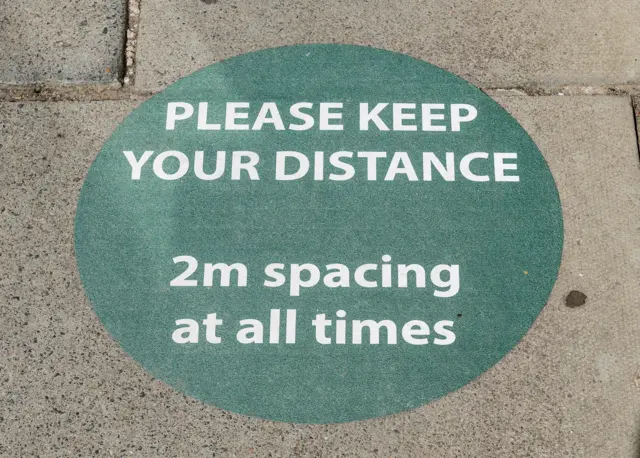 Image source, SNS
Image source, SNSAfter two days of no new deaths, the first minister confirms that seven fatalities were registered, through a lab test, as having had coronavirus
Although each death is a tragedy for the families affected, Nicola Sturgeon says the trend in the number of fatalities was continuing downward
Interim Chief Medical Officer Dr Gregor Smith says the virus was likely in Scotland and spreading in the general community before the first cases emerged
Although there is "no real certainty", Dr Smith says the virus could have been infecting people in Scotland in February, many weeks before lockdown
The Police Federation say people who commit "Covid-19 assaults" should be automatically held in custody
MSPs are to investigate the disruption to Holyrood’s budgeting as a result of the coronavirus crisis
Further plans to help communities through the pandemic are to be outlined by Scottish government
BBC Scotland News
That's all for today. We will be back early tomorrow morning with more live updates on how the coronavirus pandemic is affecting Scotland.
 Image source, SNS
Image source, SNSAllow X content?
This article contains content provided by X. We ask for your permission before anything is loaded, as they may be using cookies and other technologies. You may want to read X’s cookie policy, external and privacy policy, external before accepting. To view this content choose ‘accept and continue’.
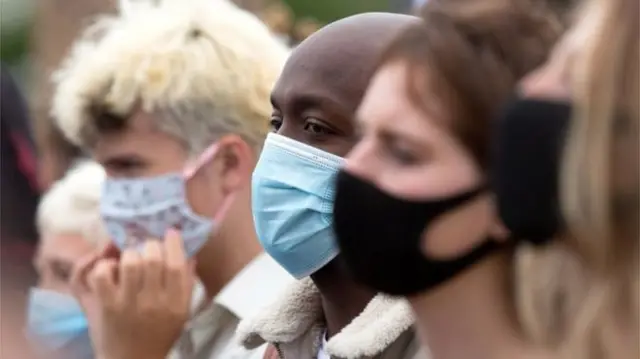 Image source, EPA
Image source, EPACoronavirus may have been spreading in Scotland before the first cases were confirmed at the start of March, the chief medical officer has said.
Dr Gregor Smith said scientists had identified early cases of the virus which had no clear link to travel.
He said this suggested that coronavirus was likely to have been spreading in the community in February.
But he stressed that these cases were likely to have been "very few in number".
Allow X content?
This article contains content provided by X. We ask for your permission before anything is loaded, as they may be using cookies and other technologies. You may want to read X’s cookie policy, external and privacy policy, external before accepting. To view this content choose ‘accept and continue’.
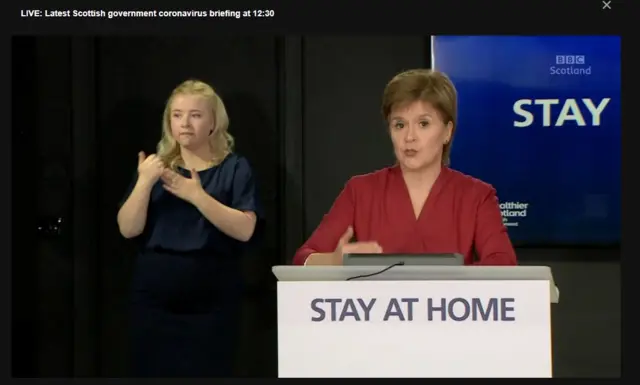
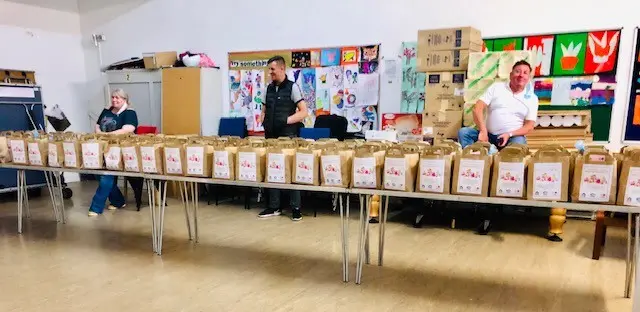 Image source, ng homes
Image source, ng homesAn afternoon tea initiative is boosting the morale of elderly residents and those who are shielding in North Glasgow.
Co-ordinated by ng homes it targets retirement complexes as well as individuals in the wider community. In the coming weeks it hopes to reach about 600 people.
It is being supported by organisations including Police Scotland, the Scottish Fire and Rescue Service, Possobilities and Partick Thistle Charitable Trust
Glasgow North East MP Anne McLaughlin said:"Many people have barely been out of their homes since March and we are aware of the huge psychological pressure this is putting on people.
"The community high tea all across the North of Glasgow is a lovely idea and I want to thank all the organisations involved.”
Allow X content?
This article contains content provided by X. We ask for your permission before anything is loaded, as they may be using cookies and other technologies. You may want to read X’s cookie policy, external and privacy policy, external before accepting. To view this content choose ‘accept and continue’.
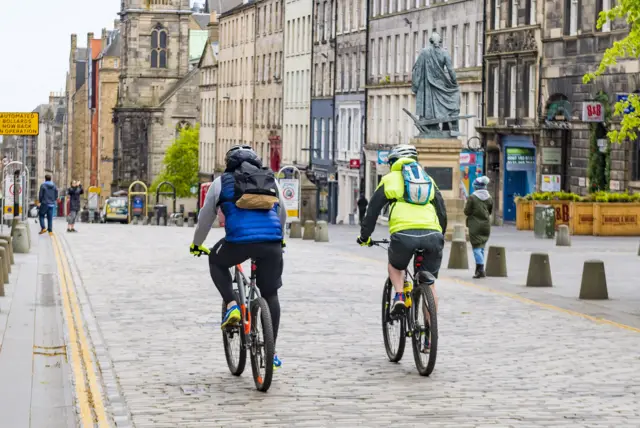 Image source, SNS
Image source, SNSThe number of people cycling in Scotland is up 77% from this time last year as cyclists take advantage of quieter roads and avoid public transport.
Cycling Scotland today released the results of a survey of 2,035 people to see how cycling behaviour might change post-lockdown.
The key findings include:
1. Coronavirus (COVID-19): framework for decision making - Phase 1 update, external
Above is an update on the government's framework for decision making.
3. Here's the Scottish government's route map out of lockdown., external
This has all four phases for easing lockdown.
If you have Covid-19 symptoms go immediately to NHS Inform online or phone 0800 028 2816 to book a test
The latest from NHS Scotland and the Scottish government, including social distancing, face covering and stay at home advice.
6. Coronavirus (COVID-19): shielding support and contacts, external
7. Support for those at high COVID-19 risk:, external
The helpline is 0800 111 4000
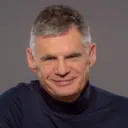 Drivetime with John Beattie
Drivetime with John Beattie
BBC Radio Scotland
Will tourism be able to open in early July, as the sector has called for?
The deputy first minister says there must be gradual process through each of the phases while making sure coronavirus is contained.
Mr Swinney says he does not want to give people false hope.
The government has given clarity on the direction of travel, he insists, highlighting that phase three will be when some tourism businesses can reopen.
 Drivetime with John Beattie
Drivetime with John Beattie
BBC Radio Scotland
Scotland's education secretary says teachers are "superb judges" of the capacity of young people and they will be able to tailor support.
John Swinney says there is an "extra special effort" to respond to the poverty-related attainment gap to help pupils overcome disadvantaged backgrounds.
The 11 August date is conditional on the science suggesting schools can reopen safety with blended learning, he adds.
Allow X content?
This article contains content provided by X. We ask for your permission before anything is loaded, as they may be using cookies and other technologies. You may want to read X’s cookie policy, external and privacy policy, external before accepting. To view this content choose ‘accept and continue’.
How much coronavirus transmission comes from people with no symptoms is still a "big unknown", a World Health Organization scientist has clarified.
Dr Maria Van Kerkhove said on Monday it was "very rare" for asymptomatic people to pass the disease on.
But she has now stressed this observation was based on a relatively small set of studies.
Evidence suggests people with symptoms are most infectious, but the disease can be passed on before they develop.
Allow X content?
This article contains content provided by X. We ask for your permission before anything is loaded, as they may be using cookies and other technologies. You may want to read X’s cookie policy, external and privacy policy, external before accepting. To view this content choose ‘accept and continue’.
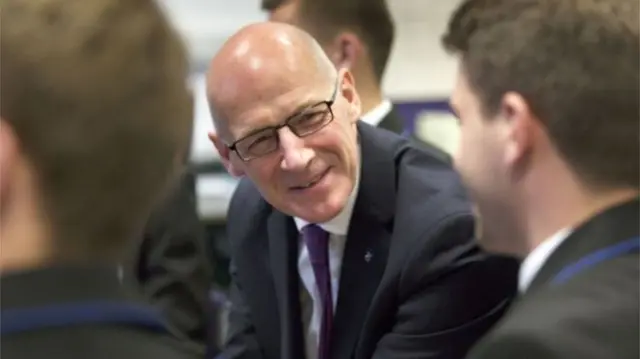 Image source, PA Media
Image source, PA MediaDeputy First Minister and Education Secretary John Swinney will shortly be on Drivetime.
Text 80295 with your questions.
 Drivetime with John Beattie
Drivetime with John Beattie
BBC Radio Scotland
Larry Flanagan, EIS general secretary, says: "Blended learning is the best opportunity we have given the circumstances we're in."
But he warns while it will mitigate some of the challenges, it will not be a silver bullet and teachers won't be able to deliver normal levels of education.
Education Scotland is creating a package for teachers to use in conjunction with classroom learning, he adds.
 Image source, Thinkstock
Image source, ThinkstockGem Scotland, a history and modern studies teacher, says teaching children while they are at home has been challenging. She says: "I am working so hard just now. I think I'm actually working harder in terms of intensity of effort."
However she reveals only around 50% of her pupils are engaging in the senior phase and a third for broad general education. This means many children will have to catch up when they come back in August.
She sets out the difficulty of planning for next year as timetables are not yet known and teachers are unable to know how much course content they will get through.
Allow X content?
This article contains content provided by X. We ask for your permission before anything is loaded, as they may be using cookies and other technologies. You may want to read X’s cookie policy, external and privacy policy, external before accepting. To view this content choose ‘accept and continue’.
 Drivetime with John Beattie
Drivetime with John Beattie
BBC Radio Scotland
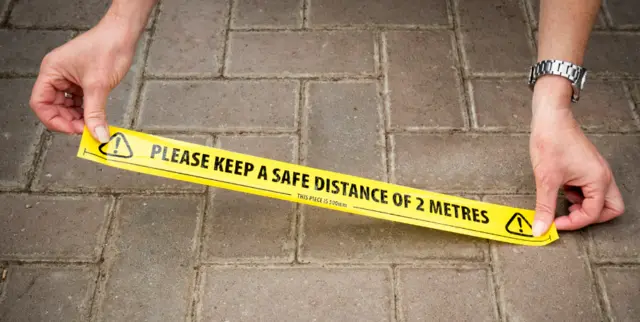 Image source, PA Media
Image source, PA MediaProfessor Jason Leitch also tells BBC Radio Scotland that there are "no imminent plans" to change the two metre distancing rule.
Many in the hospitality sector are calling for it to be reduced to one metre.
"It's a risk judgement," explains Prof Leitch. "The droplet spread is well understood but there are variations in guidance across the world. You have to decide where your percentage solution is."
He adds that the public has got used to the two metre rule, but stresses that the advice can change as we develop on the road of suppressing the virus.
"We will get back to normal life," he says. "It’s just a matter of holding our nerve until then."
Allow X content?
This article contains content provided by X. We ask for your permission before anything is loaded, as they may be using cookies and other technologies. You may want to read X’s cookie policy, external and privacy policy, external before accepting. To view this content choose ‘accept and continue’.